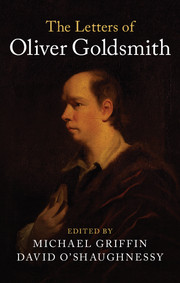51 - To William Chambers, [London, c. 19 March 1773]
Published online by Cambridge University Press: 12 December 2024
Summary
Sir William Chambers (1722–96), architect, was born in Sweden and, after being educated largely in England, returned there to work for the Swedish East India Company. He acquired great wealth as well as knowledge of Chinese architectural styles through two voyages to China in the 1740s. He later studied architecture in Paris and Rome before setting up practice in London in 1755. Initially, he lived above Tom's Coffee House and it was here that he most likely first met Goldsmith and Johnson. Chambers produced some notable publications such as ‘Of the art of laying out gardens’ (1757) (much admired by Edmund Burke and Thomas Percy), Treatise on Civil Architecture (1759), and his provocative Dissertation on Oriental Gardening (1772), which brought him into conflict with Capability Brown. The argument with Brown, as this letter shows, coincided with the appearance of She Stoops to Conquer. His career was considerably progressed by his appointment as architect to Princess Augusta at Kew, and as architectural tutor to Prince George. A number of high-profile and lucrative commissions followed, culminating in the redesign and rebuilding of Somerset House, which he began in 1775 and which kept him occupied until his death in 1796.
The letter which provoked Goldsmith's response is extant and we have reproduced it in full below. Chambers's delight in the play is evident as are his reservations about John Quick (Tony Lumpkin) and Charles Lewes (Marlow). Chambers was also keen to solicit Goldsmith's views on the second edition of the controversial Dissertation on Oriental Gardening, to which he had annexed what he purported to be an explanatory discourse by Chitqua (or Tan-Che-Qua, as the Oxford Dictionary of National Biography also offers). Chitqua (c. 1728–96) was a Chinese artist who visited England between 1769 and 1772 and who moved in socially elite circles. The addition was supposed to assuage the controversy that the first edition had caused through its attack on Capability Brown. Chambers wished to recruit Goldsmith's pen to his cause, and to sound out Burke's stance in the debate, which, as the reference to the disparaging poem in the final paragraph suggests, had established itself in the public mind.
- Type
- Chapter
- Information
- The Letters of Oliver Goldsmith , pp. 116 - 119Publisher: Cambridge University PressPrint publication year: 2018

